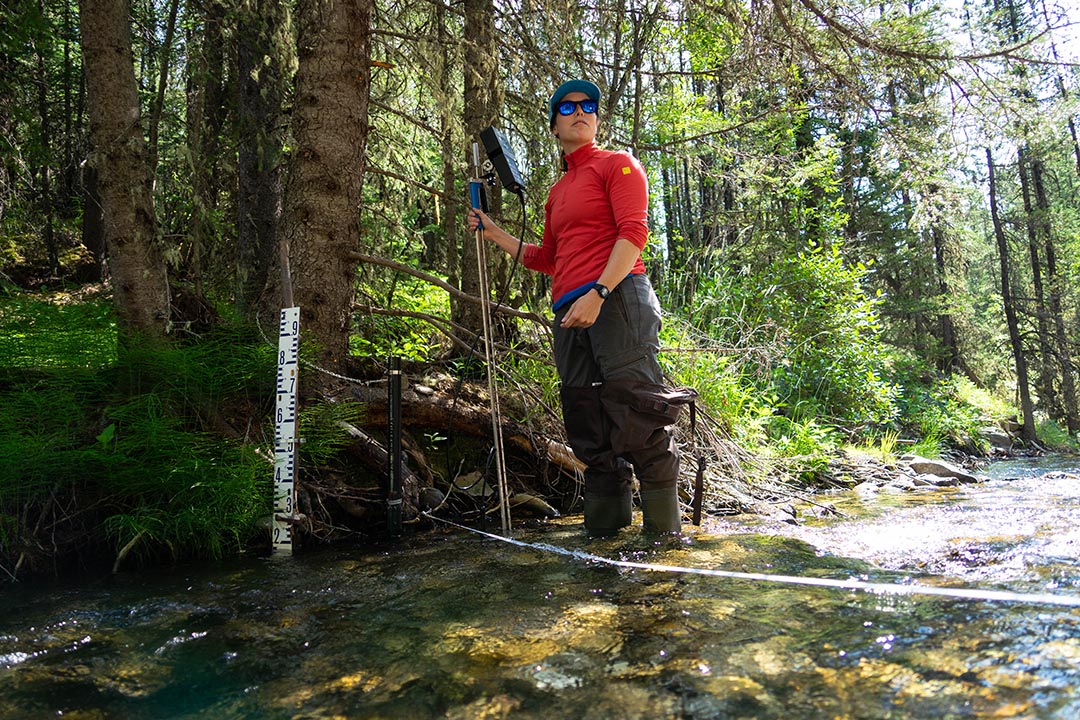
USask PhD student studying climate change in the Rockies
University of Saskatchewan (USask) hydrology PhD student Caroline Aubry-Wake has been busy studying the impact of climate change on glaciers in the Canadian Rockies.
By NAOMI ZUREVINSKISince 1985, Canadian glaciers have shrunk 15 per cent, a number that could rise to 100 per cent by the end of the century.
Such a steep increase in glacier loss in the Rockies would have a devastating impact on mountain streams in Western Canada, including a significant reduction in river water supply, which would threaten cold-water fish and ecosystems and reduce water resources for hydroelectricity on the Prairies and in B.C.
“Estimated glacier loss in the Rockies by the end of the century ranges from 75 to 100 per cent,” Aubry-Wake said. “But there’s only a few studies investigating the details of future glacier melt in Western Canada. My research will help to sharpen these estimates by focusing on three glaciers, to improve our understanding of the key processes responsible for glacier retreat at those sites.”
The glaciers Aubry-Wake is studying are the Peyto Glacier in Banff National Park, Athabasca Glacier in Jasper National Park and Bologna Glacier in the Ragged Range, Northwest Territories. Her research combines mountain fieldwork and a mathematical hydrological model to assess changes in water resources.
Aubry-Wake was one of four USask students to receive a prestigious Vanier Scholarship this year, along with health sciences PhD student and radiology resident Dr. Scott Adams (studying improving medical imaging in Northern Saskatchewan), biochemistry PhD student Zoe Gillespie (examining treating premature aging disease in children), and biology PhD student Julie Colpitts (researching feral horses to develop conservation strategies).
Aubry-Wake is supervised by Dr. John Pomeroy (PhD), the USask Canada Research Chair in Water Resources and Climate Change. Pomeroy notes that documenting changes to Canada’s glaciers helps us better predict future water supplies.
“The impacts of climate change are occurring quickly and to a greater degree than anticipated, and one of these impacts is the deglaciation of our mountains and the (resulting) alteration of mountain rivers, which supply water to surrounding regions and contribute to rising sea levels,” Pomeroy said. “Caroline’s research focuses on exactly this, and will help not only Saskatchewan to better anticipate its future water supply, but it also has implications for rivers that supply water for two billion people worldwide.”
For Aubry-Wake, her work has taken on new meaning with the release of a United Nations Intergovernmental Panel on Climate Change (IPCC) report in October, which stated that without substantial action now to reduce greenhouse gas emissions, we will not be able to keep global warming to a maximum of 1.5 degrees Celsius 12 years from now. Increasing to two degrees Celsius will increase the risk of major climate change catastrophe.
“I think that report clarifies climate science and heightens the urgency for society to advocate for policy that addresses the broad issues associated with climate change,” Aubry-Wake said. “Climate change already has an impact on our water resources in Western Canada. This recent IPCC report confirms that if we don’t act fast, climate change will have disastrous effects.”
Aubry-Wake notes that it’s not only scientists who have work to do, but society as a whole.
“The difference between 1.5 and two degrees will be seen in the intensity of droughts, forest fires, floods, and potentially the difference between 100 and 75 per cent glacier loss in the Rockies. To stay within 1.5 requires large changes in how we live, but we can still adapt and succeed as a society. But the two (degrees) comes closer to a world we don’t want to live in.”
With that urgency in mind, Aubry-Wake remembers spending summers hiking and skiing in the Rockies, and hopes we can all do our part to make sure future generations can enjoy these same activities.
“Climate change is the biggest issue our society is facing, and although it might seem insurmountable, we have the capacity to step up and maintain a stable climate system that supports a good quality of life,” she said. “There’s a lot of information out there about individual actions that make a difference, like recycling, taking public transportation and eating less meat.
“I believe the change we need to see is societal, and it starts by electing officials who have strong environmental policies … even though they might seem restrictive for the economy. But it’s the only way we can have a future where our kids and grandkids can be happy, and still go skiing in the winter, for example.”

